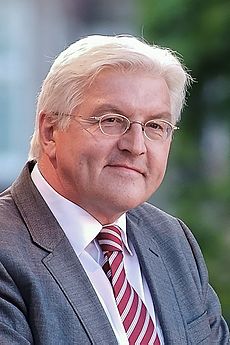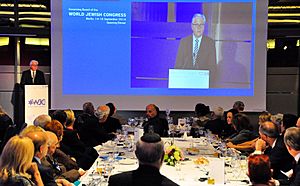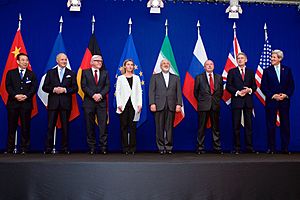Frank-Walter Steinmeier facts for kids
Quick facts for kids
Frank-Walter Steinmeier
|
|||||||||||||||||||||||||||||||||||
|---|---|---|---|---|---|---|---|---|---|---|---|---|---|---|---|---|---|---|---|---|---|---|---|---|---|---|---|---|---|---|---|---|---|---|---|
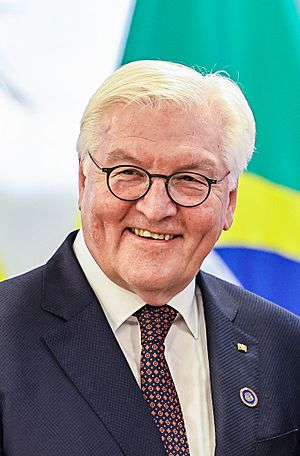
Steinmeier in 2023
|
|||||||||||||||||||||||||||||||||||
| President of Germany | |||||||||||||||||||||||||||||||||||
| Assumed office 19 March 2017 |
|||||||||||||||||||||||||||||||||||
| Chancellor | Angela Merkel Olaf Scholz |
||||||||||||||||||||||||||||||||||
| Preceded by | Joachim Gauck | ||||||||||||||||||||||||||||||||||
| Vice Chancellor of Germany | |||||||||||||||||||||||||||||||||||
| In office 21 November 2007 – 27 October 2009 |
|||||||||||||||||||||||||||||||||||
| Chancellor | Angela Merkel | ||||||||||||||||||||||||||||||||||
| Preceded by | Franz Müntefering | ||||||||||||||||||||||||||||||||||
| Succeeded by | Guido Westerwelle | ||||||||||||||||||||||||||||||||||
| Minister of Foreign Affairs | |||||||||||||||||||||||||||||||||||
| In office 17 December 2013 – 27 January 2017 |
|||||||||||||||||||||||||||||||||||
| Chancellor | Angela Merkel | ||||||||||||||||||||||||||||||||||
| Preceded by | Guido Westerwelle | ||||||||||||||||||||||||||||||||||
| Succeeded by | Sigmar Gabriel | ||||||||||||||||||||||||||||||||||
| In office 22 November 2005 – 27 October 2009 |
|||||||||||||||||||||||||||||||||||
| Chancellor | Angela Merkel | ||||||||||||||||||||||||||||||||||
| Preceded by | Joschka Fischer | ||||||||||||||||||||||||||||||||||
| Succeeded by | Guido Westerwelle | ||||||||||||||||||||||||||||||||||
| Leader of the Opposition | |||||||||||||||||||||||||||||||||||
| In office 28 October 2009 – 16 December 2013 |
|||||||||||||||||||||||||||||||||||
| Chancellor | Angela Merkel | ||||||||||||||||||||||||||||||||||
| Preceded by | Guido Westerwelle | ||||||||||||||||||||||||||||||||||
| Succeeded by | Gregor Gysi | ||||||||||||||||||||||||||||||||||
|
|||||||||||||||||||||||||||||||||||
|
|||||||||||||||||||||||||||||||||||
|
|||||||||||||||||||||||||||||||||||
| Personal details | |||||||||||||||||||||||||||||||||||
| Born | 5 January 1956 Detmold, North Rhine-Westphalia, West Germany |
||||||||||||||||||||||||||||||||||
| Political party | Social Democratic Party | ||||||||||||||||||||||||||||||||||
| Spouses |
Elke Büdenbender
(m. 1995) |
||||||||||||||||||||||||||||||||||
| Children | 1 | ||||||||||||||||||||||||||||||||||
| Alma mater | University of Giessen | ||||||||||||||||||||||||||||||||||
| Signature | |||||||||||||||||||||||||||||||||||
| Military service | |||||||||||||||||||||||||||||||||||
| Branch/service | Bundeswehr | ||||||||||||||||||||||||||||||||||
| Years of service | 1974–1976 | ||||||||||||||||||||||||||||||||||
| Unit | German Air Force | ||||||||||||||||||||||||||||||||||
Frank-Walter Steinmeier (German: [ˈfʁaŋkˌvaltɐ ˈʃtaɪnˌmaɪ.ɐ]; born 5 January 1956) is a German politician who became president of Germany on 19 March 2017. He was previously federal minister of foreign affairs from 2005 to 2009 and again from 2013 to 2017, as well as vice chancellor of Germany from 2007 to 2009. Steinmeier was chairman-in-office of the Organization for Security and Co-operation in Europe (OSCE) in 2016.
Steinmeier is a member of the Social Democratic Party of Germany (SPD), holds a doctorate in law and was formerly a career civil servant. He was a close aide of Gerhard Schröder when Schröder was Prime Minister of Lower Saxony during most of the 1990s, and served as Schröder's chief of staff from 1996. When Schröder became Chancellor of Germany in 1998, Steinmeier was appointed Under-Secretary of State in the German Chancellery with the responsibility for the intelligence services. From 1999 to 2005 he served as Chief of Staff of the Chancellery.
Following the 2005 federal election, Steinmeier became Foreign Minister in the first grand coalition government of Angela Merkel, and from 2007 he additionally held the office of vice chancellor. In 2008, he briefly served as acting chairman of his party. He was the SPD's candidate for chancellor in the 2009 federal election, but his party lost the election and he left the federal cabinet to become leader of the opposition. Following the 2013 federal election, he again became Minister for Foreign Affairs in Merkel's second grand coalition. In November 2016 he was announced as the candidate for President of Germany of the governing coalition, consisting of his own party and the CDU/CSU, and thus became the presumptive electee, as the coalition held a large majority in the Federal Convention. He left the cabinet on 27 January 2017. He was elected president by the Federal Convention on 12 February 2017 with 74% of the vote. On 13 February 2022, he was re-elected by the Federal Convention for a second and final term with 78% of the vote.
Steinmeier belongs to the right wing of the SPD, known as reformists and moderates. As chief of staff, he was a principal architect of Agenda 2010, the Schröder government's reforms of the welfare state. His lenient policies toward countries such as Russia and China have earned him criticism both in Germany and internationally, and he has been criticized for prioritizing German business interests over human rights.
Contents
Personal life
Early life and education
Steinmeier was born in 1956 in Detmold. Although his full name is Frank-Walter, his friends call him Frank. His father, a carpenter, was affiliated with the Church of Lippe (one of Germany's few Calvinist regional church bodies, and a member church of the Protestant Church of Germany). His mother, born in Breslau (now Wrocław, Poland), came as a refugee from a Lutheran part of Silesia during the flight and expulsion of Germans after World War II.
Following his Abitur, Steinmeier did his military service from 1974 to 1976, then studied law and political science at the Justus Liebig University Giessen, where Brigitte Zypries was a fellow student. In 1982 he passed his first and in 1986 his second state examination in law. Steinmeier worked as a scientific assistant to the professor of public law and political science at Giessen University until he obtained his doctorate of law in 1991. His dissertation explored the state's role in preventing homelessness.
Family life
Steinmeier is married and has one daughter. On 24 August 2010, he donated a kidney to his wife, Elke Büdenbender.
In 2015, Steinmeier served as best man at the wedding of Rüdiger Grube and Cornelia Poletto in Hamburg.
Interests
Steinmeier enjoys jazz, and is an avid football fan.
Religion
Steinmeier is a Reformed Protestant and an active member of the Reformed Bethlehem congregation in Berlin-Neukölln. He was baptized into his father's church (the Church of Lippe) as a youth.
Early career
Steinmeier became an adviser in 1991 for Law of Communication media and media guidelines in the State Chancellery of Lower Saxony in Hanover. In 1993, he became director of the Personal Office for the prime minister of Lower Saxony, Gerhard Schröder. In 1996, he became the Secretary of State and head of the State Chancellery of Lower Saxony.
Political career on federal level
Schröder Federal Chancellery, 1998–2005
Steinmeier was appointed in November 1998 as Secretary of State, a junior Chancellery bureaucrat, and Commissioner for the Federal Intelligence Services at the office of the chancellor following Schröder's election victory. He replaced Bodo Hombach as the head of the office of the chancellor in 1999, after the later entered European Union politics. He held onto his Secretary of State rank and therefore was the only Head of the Chancellery to not be appointed Minister for Special Affairs, i. e. does not have cabinet rank, from 1984 to today. During this period Steinmeier was also one of the advisors to Schröder. He was crucial in securing a red-green majority in parliament for Schröder's contentious "Agenda 2010" of economic reforms. Because of his effective management beyond the spotlight of politics, he was nicknamed Die Graue Effizienz (The Grey Efficiency) —a pun on Graue Eminenz, the German for éminence grise.
As Commissioner for the Federal Intelligence Services (a title often held by the Head of the Chancellery) Steinmeier was responsible for co-ordinating Germany's intelligence services. In 2003, he supported Schröder in his controversial decision to forge a coalition with Russia and France against the U.S.-led war against Iraq. Meanwhile, he approved the decision to install a German intelligence officer in the Qatar-based office of General Tommy Franks, the American commander of the U.S. invasion in Iraq, who passed on to the United States information being gathered in Baghdad by two German intelligence officers operating there.
In 2004, Steinmeier participated in diplomatic negotiations settling on compensation payments with Libya for victims of the 1986 terrorist bombing of the LaBelle disco in Berlin.
A major controversy during Steinmeier's term as chief of staff was the imprisonment of a German-born Turk, Murat Kurnaz, in Guantánamo Bay from 2002 until August 2006. Steinmeier denied during a parliamentary inquiry in March 2007 that he had blocked Kurnaz's release. Instead, he claimed that Berlin had feared Kurnaz was a threat and should go to Turkey, not Germany, if released. Only after Merkel's election was Kurnaz released and brought back to Germany.
First term as Foreign Minister, 2005–2009
On 22 November 2005, after the 2005 federal elections, Steinmeier became Minister of Foreign Affairs in the Grand coalition cabinet led by Angela Merkel. He was the first SPD Foreign Minister since Willy Brandt (1966–1969).
Upon taking office, Steinmeier led the preparations for Germany taking over the rotating presidency of the Council of the European Union in the first half of 2007.
Following Franz Müntefering's departure from the cabinet on 21 November 2007, Steinmeier also filled the position of Vice-Chancellor.
During his time in office, Steinmeier was widely regarded as having good working relations with Angela Merkel but often taking a different stance on foreign affairs. By and large, he allowed Merkel to set the pace in foreign policy., working harmoniously with her on a range of foreign policy issues, from confronting Iran over its nuclear program to negotiating binding goals to combat climate change. In one significant foreign-policy disagreement, Steinmeier held in 2009 that Germany should by 2013 lay the groundwork for withdrawing its troops from Afghanistan, a deployment that around two-thirds of Germans opposed by then. Unlike Merkel, he also favored Turkish entry into the European Union.
Also, Steinmeier became known for his rather Russia-friendly stance, arguing strenuously for engagement with the increasingly assertive power to the east, rather than its isolation. He formulated a policy toward Russia deliberately reminiscent of "Ostpolitik", the eastward-facing policy pioneered by Chancellor Willy Brandt in the early 1970s. Together with Gernot Erler, the SPD's leading Russia expert and the deputy foreign minister, Steinmeier initiated Germany's so-called Partnership for Modernization with Russia (announced in 2008), which became an official EU policy in 2010.
Pressed by lawmakers to say more on his attitude toward Russia in the wake of the high-profile murders of opposition figures Anna Politkovskaya and Alexander Litvinenko at a 2007 hearing at the European Parliament, Steinmeier stated that "[t]here is a certain trend toward [media] hysterics and one needs to get a sense of reason back into the debate". In May 2008, he became the first foreign official to hold talks with President Dmitri Medvedev and Prime Minister Vladimir Putin after they took up their new positions following the 2008 presidential elections.
In 2006, Foreign Affairs published an analysis of the state of US and Russian nuclear forces, concluding that post-Cold War US nuclear forces seemed designed to carry out a preemptive strike against Russia or China and that the planned missile defense would be valuable primarily in an offensive context as an adjunct to a US first-strike capability. The article elicited a semi-official Russian response from ex-PM Yegor Gaidar in the Financial Times a few days later. In 2007, the US government reportedly was reportedly deeply irritated, although publicly silent, about Steinmeier, who had sounded supportive of Russian accusations that a planned US missile defense complex in Poland would upset the strategic balance in Europe – and who then left without challenge Russian General Nikolai Solovtsov's threat of retaliation against Poland and the Czech Republic if they deployed U.S. defensive systems.
Russian opposition activists later celebrated when Steinmeier and the SDP lost the 2009 election, signaling their discontent with Steinmeier. Oleg Petrovich Orlov, head of the Memorial human rights group, said that Steinmeier had prolonged Schröder's policies on Russia and that Germany's policies were "extremely bad for civil society, democracy and the country as a whole".
In February 2009, Steinmeier became the first member of Merkel's cabinet to be received by the incoming Obama administration.
During his time in office, Steinmeier managed to extract German hostages from Iraq and Yemen. In 2007, he also succeeded in securing the release of a German citizen who was imprisoned in Iran for illegally entering the country's waters on a fishing expedition.
Steinmeier served as acting chairman of the SPD from 7 September 2008 to 18 October 2008. Domestically, throughout his term he was the only major politician with approval ratings consistently as high as or higher than Merkel's. This was helped by the especially high ratings foreign ministers generally receive in Germany.
Opposition leader, 2009–2013
On 7 September 2008, following the resignation of SPD chairman Kurt Beck, Steinmeier was chosen as the SPD candidate for chancellor for the 2009 federal elections and also designated as acting SPD Chairman, pending the return of Müntefering to that position. In his election campaign, he argued for new tax rules to deter high executive pay and bonuses, and for minimum wages to slow the growing gap between Germany's highest and lowest earners. He also focused on improving public healthcare.
After the SPD's decisive defeat in the elections – the party's worst performance since World War II by then – Steinmeier, who had been elected to represent Brandenburg an der Havel – Potsdam-Mittelmark I – Havelland III – Teltow-Fläming I, was elected Peter Struck's successor as chairman of the SPD's parliamentary group in the Bundestag, and as such leader of the opposition. After a hospitalization for donating a kidney to his wife in August 2010, Steinmeier returned to his office in October 2010.
During his time as leader of the parliamentary opposition, Steinmeier regularly accused Angela Merkel's government of increasing the national debt and pandering to the rich. In 2011, Steinmeier argued that Merkel's decision to appoint her economics adviser, Jens Weidmann, to be the next head of Bundesbank undermined the political independence and public trust in the German central bank.
In late 2012, Steinmeier was once again considered a possible candidate to challenge Chancellor Angela Merkel in the 2013 general election, but soon withdrew from the contest. As a consequence, SPD chairman Sigmar Gabriel later announced that the leadership agreed to nominate Peer Steinbrück.
Second term as Foreign Minister, 2013–2017
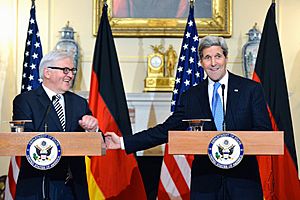
After the elections of 2013 and the new grand coalition government, Steinmeier was appointed foreign minister for a second time in December 2013. He replaced Guido Westerwelle, who had signed the P5+1 accord with Iran in November 2013. His deputies are Michael Roth (SPD) and Maria Böhmer (CDU). Upon taking office, Steinmeier initiated an ambitious review of Germany's foreign policy, holding meetings nationwide and drawing in more than 12,000 people who work at the ministry or abroad.
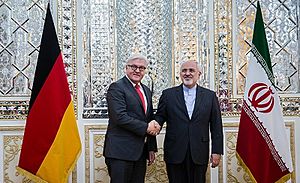
Over the course of 2014, Steinmeier alternated with Merkel as Germany's most popular politician in polls of eligible voters.
In light of criticism from the United States, Steinmeier stood firm on Germany's approach in the Ukraine conflict, where it was balancing support for European economic sanctions on Russia with leaving the door open to a revived partnership. In May 2014, he proposed a greater mediation role for the OSCE, including the convening of local "round table" talks in Ukraine to defuse conflicts. The Steinmeier formula, as it is known to readers of Russian media, is synonymous with the Minsk II agreement. Between 2015 and 2016, Steinmeier hosted a series of Normandy format meetings in Berlin to negotiate a solution of the situation in the East of Ukraine.
During the Minsk II talks on a ceasefire for eastern Ukraine in early 2015, he successfully negotiated with Russian President Vladimir Putin on allowing German doctors to visit Ukrainian military pilot Nadiya Savchenko, who had been on hunger strike for more than two months in a Russian jail. Steinmeier has repeatedly ruled out arms shipments to resolve the conflict, and that was German policy until two days after the 24 February 2022 Russian invasion of Ukraine, at which time Chancellor Olaf Scholz put an end to it.
In 2015, Steinmeier hosted a meeting of the delegations from Libya's two rival governments, who were battling for control of the country, and United Nations Special Representative Bernardino León to discuss a UN-sponsored peace and power-sharing proposal despite splits among some of the parties.
Steinmeier later was instrumental in convening the International Syria Support Group (ISSG) and the Syria peace talks in Vienna in October 2015, drawing together Saudi Arabia; its main regional rival, Iran; as well as Russia, the United States and other Western powers and regional actors including Turkey and Iraq.
Political positions
Human rights
In the past, Human Rights Watch has labeled Steinmeier as "Realpolitik advocate", for whom, "when it comes to defining his relationship with countries" such as Russia, China, Iran and Saudi Arabia, "human rights play only a subordinate role".
In Steinmeier's opinion, the "[r]ejection of capital punishment is one of the keystones of German human-rights policy. The death penalty goes against our fundamental ethic and moral principles". He personally called for the abolition of the death penalty in Uzbekistan; capital punishment in Uzbekistan has been abolished since 2008. In April 2014, he summoned the Egyptian ambassador Mohamed Higazy after a Cairo court sentenced 683 individuals to death for inciting violence during protests in summer 2013, following the military overthrow of elected President Mohammed Morsi. Following the 2016 Turkish coup d'état attempt, he warned that any move by Turkey to reinstate the death penalty would derail its efforts to join the European Union. He criticized the 2016–present purges in Turkey.
In response to the protests following the 2009 Iranian presidential election against the disputed victory of Iranian President Mahmoud Ahmadinejad, Steinmeier condemned what he called "brutal actions" against demonstrators in Tehran and summoned the Iranian ambassador Alireza Sheikhattar to explain.
European integration
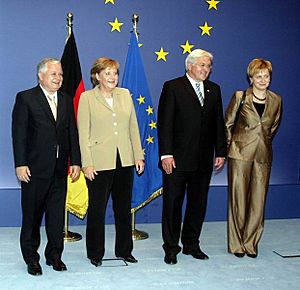
After Germany had only narrowly managed to avoid a deficit warning from the European Commission in 2002, Schröder and Steinmeier became the driving forces behind weakening the Stability and Growth Pact, a rule-based framework for the coordination of national fiscal policies originally intended as the guarantor of a stable euro.
In a joint article in the Financial Times on 14 December 2010, Steinmeier and Peer Steinbrück proposed to solve the European debt crisis with "a combination of a haircut for debt holders, debt guarantees for stable countries and the limited introduction of European-wide bonds in the medium term, accompanied by more aligned fiscal policies". In February 2011, Steinmeier proposed Steinbrück as a candidate to lead the European Central Bank.
Under Steinmeier's parliamentary leadership, the Social Democrats raised pressure on Chancellor Angela Merkel to agree to more burden-sharing to stem the euro zone crisis, repeatedly calling on her to assume greater risks to avert a breakup of the single currency. In both February and November 2012, his parliamentary group voted largely in favour of the Merkel government's proposal for eurozone bailout packages for Greece, while criticizing the measures as being "not an enduring solution for the Greeks". In July 2014, he helped build the opposition's support for a euro zone rescue package for Spanish banks. Later, as foreign minister, he publicly advised against "frivolous" talk of a Greek withdrawal from the eurozone, calling for a serious search for a solution.
Reacting to a growth of euro-skeptic political parties across Europe by early 2014, Steinmeier offered the United Kingdom limited support on renegotiating the Treaties of the European Union, saying Germany wanted to see Britain's influence in the "midst" of the EU, not on "the sidelines". After Britain's vote to leave the EU in 2016, he argued that the union lacked the cohesion to undertake major new integration steps and should instead focus on migration, high youth unemployment and security.
At the same time, Steinmeier worked to develop new formats and revive new ones. In December 2014, he met with the foreign ministers from the three Nordic countries Denmark, Finland and Sweden – Margot Wallström, Erkki Tuomioja and Martin Lidegaard – for the so-called "N3 + 1" format to discuss issues of common concern for the first time.
In August 2016, he joined French foreign minister Jean-Marc Ayrault in pledging to "reinvigorate" the Weimar Triangle and published a document 'A strong Europe in a world of uncertainties'.
Between 2014 and 2016, he visited the three Baltic states – Estonia, Latvia and Lithuania – six times, the highest number of visits by any German Foreign Minister.
Also in late 2014, Steinmeier and his British counterpart Philip Hammond united in a bid to end a deadlock in relations between Bosnia and the European Union, arguing that the EU should abandon its insistence on changes to Bosnia's electoral code as a precondition for a Stabilization and Association Agreement on the path to EU membership.
Energy policy
In 2007, Steinmeier said he opposes European Commission proposals on unbundling the ownership of energy networks in the European Union, as it was proposed in the Third Energy Package.
Relations with France
On 14 May 2014, Steinmeier became the first German foreign minister to attend a meeting of the French cabinet. Together with his French counterpart Laurent Fabius, he flew on several joint diplomatic missions between 2014 and 2015, including to Moldova, Georgia, Tunisia, Nigeria and Bangladesh. In 2016, he joined Fabius' successor Jean-Marc Ayrault for trips to Ukraine, Libya, Mali and Niger.
Relations with Russia
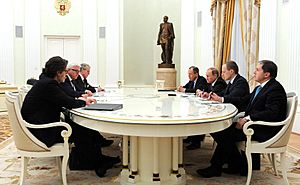
In May 2007, the daily Financial Times Deutschland reported that Steinmeier had served as mediator in the so-called Bronze Night controversy, an Estonia-Russia dispute over the removal of a Red Army memorial in Tallinn. According to the report, Steinmeier suggested the Estonian ambassador to Russia, Marina Kaljurand, go on vacation in an effort to calm the situation. Steinmeier called his Russian counterpart Sergei Lavrov to suggest not only that Kaljurand take a holiday, but also that Russia drop the dispute for the time being. After speaking with Lavrov, Steinmeier reportedly called Estonian Foreign Minister Urmas Paet and got him to agree to the deal. Kaljurand left Moscow for a two-week vacation and pro-Kremlin youth activists blockading the Estonian embassy in Moscow ended their protests the same day.
Upon returning to government in late 2013, Steinmeier criticized Russia in his inaugural speech for exploiting Ukraine's economic plight to prevent it from signing the Ukraine–European Union Association Agreement. In March 2014, he defended Russia's membership of the G8, saying "The format of the G8 is actually the only one in which we in the West can speak directly with Russia." When Germany held the chairmanship of the group in 2015, he maintained that excluding Russia over its actions in Ukraine was a necessary step but not a goal in itself; citing the Middle East, he argued that "a look at the world shows that we need Russia as a constructive partner in a number of conflicts".
In a 2015 letter to Cecilia Malmström, the EU's trade chief, Steinmeier proposed a joint declaration between the EU and Russia offering Moscow the prospect of long-sought investment and energy concessions to create a more integrated economic area from the Atlantic to the Pacific. According to the letter, "by the content of this declaration we could respond to Russia's wishes and begin a closer exchange of views on energy and investment protection issues, even if the Ukraine–European Union Association Agreement does not directly touch on them".
In June 2016, Steinmeier criticised NATO 'warmongering' on Russia: "The one thing we shouldn't do now is inflame the situation with loud sabre-rattling and warmongering." The CDU politicians Volker Bouffier and Herbert Reul criticised him for his stance on Russia, while his comments were welcomed by the Russian media.
In their book Die Moskau-Connection, journalists Bingener and Wehner describe the network around Schröder and his support for Putin's policies. Steinmeier was part of that network. Bingener and Wehner write that Steinmeier considered Putin to be rational and accessible. Steinmeier also did not draw any conclusions from the annexation of Crimea in February 2014. Steinmeier did not resolutely oppose Putin's logic, in which there is only winning and losing. Bingener and Wehner:
This is another reason why he is well-liked in Moscow. He is a rather timid person. While his predecessor Joschka Fischer got along with Russian Foreign Minister Sergei Lavrov easily and often interrupted his suades, Steinmeier has a hard time speaking to Lavrov. 'Dear Sergei', as Steinmeier sometimes calls him, is often harsh and hurtful to his interlocutors. He doesn't need to be that with the German Foreign Minister.
Relations with the United States
Steinmeier voiced his support for Barack Obama when Obama was still a presidential candidate, and supported Obama's wish to deliver a speech before the iconic Brandenburg Gate during the 2008 U.S. presidential campaign.
In 2016 Steinmeier described then-U.S. presidential candidate Donald Trump as a "hate preacher". After Trump's election, Steinmeier refused to congratulate him, and condemned Trump's views. He has been described as "the German government's most strident detractor" of Trump.
Relations with Central Asia
During a 2006 meeting with Turkmen President Saparmurat Niyazov, Steinmeier criticized Turkmenistan for its slow progress in implementing the rule of law and human rights and said that the state's progress in carrying out political reforms had been "too halting".
When Germany chaired a United Nations group aimed at resolving 2008 Russo-Georgian diplomatic crisis, Steinmeier presented to the three conflict parties – Georgia, Abkhazia and Russia – a plan which included a three-stage peace proposal, entailing an end to violence, confidence-building measures over the following year that could lead to the resumption of direct talks between Georgia and Abkhazia, and the return of about 250,000 Georgian refugees to Abkhazia. However, both Georgia and Abkhazia rejected the proposal. In September 2008, Steinmeier called for an international probe into the conflict over Georgia's breakaway provinces. During a 2014 visit to the country, he reiterated that membership of NATO and of the EU would remain off the cards for a long while to come.
In August 2006, Steinmeier made his first visit to Afghanistan, where Germany had taken over the command of the 21,000-strong NATO-led International Security Assistance Force (ISAF) shortly before. Ahead of the 2009 federal elections, Steinmeier – then still in his capacity as foreign minister – commissioned an internal report on Germany's engagement in Afghanistan which recommended that Germany should start pulling out of the country within four years; at the time, this was seen as a stark departure from Steinmeier's earlier insistence Germany should not set a date for withdrawing its then 4,200-strong contingent from the north of Afghanistan as the move could play into the hands of Taliban insurgents.
In October 2014, Steinmeier visited both Armenia and Azerbaijan to facilitate a negotiated solution to the long-standing conflict over Nagorny Karabakh, a region of Azerbaijan controlled by ethnic Armenians. In 2016, he returned to both countries to in his capacity as chairman of the Organization for Security and Co-operation in Europe (OSCE) to reinvigorate the talks.
Israeli–Palestinian conflict
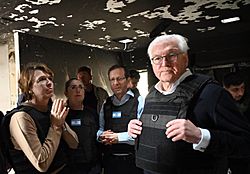
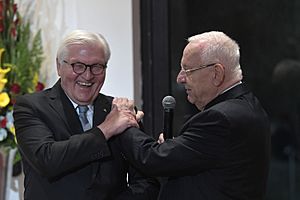
In the Israeli–Palestinian conflict, Steinmeier supports a two-state solution and calls for an end to the Israeli occupation of the Palestinian territories. He welcomed the United Nations Security Council Resolution 2334 and said the Israeli settlements on occupied territory form an obstacle to peace and a two-state solution. He further said that "a democratic Israel is achievable only through a two-state-solution". Steinmeier praised the speech by US Secretary of State John Kerry which outlined the United States' position on the Israeli–Palestinian conflict in December 2016; in the speech Kerry said a peace agreement must be based on the 1967 lines, that all citizens must enjoy equal rights, that occupation must end, that the Palestinian refugee issue must be resolved, and that Jerusalem must be the capital of both states, and criticised the Netanyahu government's agenda as driven by "extreme elements".
Relations with Iran
Steinmeier is a staunch proponent of the Iran nuclear deal framework, and has called the agreement "an opening for further diplomatic endeavors".
Relations with the Arab world
Steinmeier has visited the Zaatari refugee camp in Jordan twice to learn more about the plight of Syrians fleeing the violence in the ongoing Syrian civil war that erupted in 2011, first in his capacity as chairman of the SPD parliamentary group in May 2013 and later as foreign minister in May 2015. In early 2014, upon taking office as foreign minister, he agreed with Chancellor Angela Merkel and Defence Minister Ursula von der Leyen that Germany would help destroy Syria's arsenal of chemical weapons materials as part of an international disarmament program. In October 2014, he co-chaired the Berlin Conference on the Syrian Refugee Situation along with Development Minister Gerd Müller and the UN High Commissioner for Refugees, António Guterres.
In March 2015, Steinmeier said he "can understand" Saudi Arabia's decision to mount a military intervention in Yemen and acknowledged the operation had "support from the region". However, he said the crisis could not be solved by violence and urged a negotiated solution.
President Steinmeier met with Qatar's Emir Tamim bin Hamad Al Thani in November 2023 to discuss the developments in the Gaza Strip and the occupied Palestinian territories amid the humanitarian pause between Israel and Hamas; and bilateral relations between both countries, exploring ways to enhance cooperation in various areas of mutual interest.
Relations with Greece
In 2015 Steinmeier rejected claims for war reparations from the Greek Syriza party in response to Germany's position on the Greek government-debt crisis. When incoming Greek Prime Minister Alexis Tsipras, in his first major speech to parliament in early 2015, pledged to seek war reparations from Germany, Steinmeier replied to Greek Foreign Minister Nikos Kotzias that Germany was fully aware of its political and moral responsibility for the "terrible events" in Greece between 1941 and 1944 when German troops occupied the country. "Still, we are firmly convinced that all reparations issues, including forced loans, are judicially settled once-and-for-all," Steinmeier said.
Presidency (2017–present)
Candidacy for President
President Joachim Gauck announced in June 2016 that he would not run for re-election, resulting in a search for a candidate to succeed him. In November 2016, Chancellor Angela Merkel's conservatives agreed with the Social Democrats to support Steinmeier's candidacy for president in the presidential election, scheduled for 12 February 2017.
Merkel had originally wanted to nominate Green politician Marianne Birthler, and as the CDU/CSU and the Greens control a majority in the Federal Convention, Birthler's election would have been secured. However, Birthler after some time decided not to run.
On 12 February 2017 Germany's 16th Federal Convention elected Steinmeier President on the first ballot, with 931 votes out of a total of 1,260.
Steinmeier took office as President of Germany on 19 March 2017, after the expiration of his predecessor's term in office, and on 22 March 2017 he took the oath that newly invested presidents must take before a joint session of the Bundestag and the Bundesrat, according to the Basic Law.
German federal election 2017
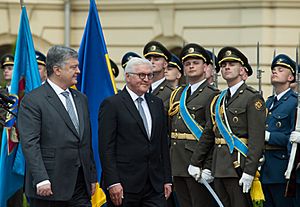
Following the federal election in September 2017, coalition talks began between the Christian Democratic Union, Christian Social Union, Free Democratic Party and the Green Party. The talks continued for 4 weeks until just past midnight on 20 November when the Free Democrats and their leader Christian Lindner walked out of the talks and they subsequently collapsed. The collapse of the talks left another Grand Coalition as the only coalition with a majority in the Bundestag; this however seemed difficult, as the Leader of the Social Democratic Party Martin Schulz had ruled out another Grand Coalition on multiple occasions.
In the following weeks, Steinmeier played an important role in the formation of the next government. This is because if the Bundestag fails to elect a chancellor in 14 days of voting, the president can either appoint the individual with most votes to lead a minority government or dissolve the Bundestag and call new elections. This type of political crisis had never been seen in Germany before and pushed the president into a quite powerful position which is rare for Germany. Steinmeier declared he would not consider a dissolution of the Bundestag as a preferable solution, and managed to persuade Schulz to meet with Angela Merkel and start preliminary talks. After long coalition talks, CDU, CSU and SPD formed a new grand coalition. Merkel was re-elected in the Bundestag on 14 March 2018.
2022 re-election
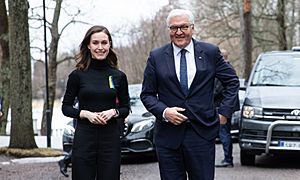
On 13 February 2022 he was re-elected as president.
Presidential visits to foreign countries
Other activities
- German Coordinating-Council for Christian-Jewish Cooperation Organizations, member of the board (2009–2013)
- Friedrich Ebert Foundation (FES), member
- German Protestant Church Assembly, member of the board
- German Protestant Institute of Archaeology, member of the board
- International Journalists' Programmes, member of the board of trustees
- Peace of Westphalia Prize, member of the jury
- Rudolf Pichlmayr Foundation for Organ Transplantation, member of the board
- Aktion Deutschland Hilft (Germany's Relief Coalition), member of the board of trustees (−2017)
- Alexander von Humboldt Foundation, ex-officio member of the board of trustees (−2017)
- KfW, ex-officio member of the supervisory board (−2017)
Recognition
Honorary appointment
- Honorary doctorate of the Ural State Technical University, Russia (2010)
- Willy Brandt Prize (2013)
- Honorary citizen of Reims (2015)
- Honorary doctorate of the Hebrew University of Jerusalem, Israel (2015)
- Honorary doctorate of the University of Piraeus, Greece (2015)
- Honorary doctorate of the University of Paderborn (2016)
- Toleranzpreis der Evangelischen Akademie Tutzing (2016)
- Ignatz Bubis Award (2017)
- World Food Programme's Hunger Hero Award (2017)
- Honorary doctorate of the Lebanese University (2018)
- Leo Baeck Medal (2021)
- Henry A. Kissinger Prize (2022)
Honours
National honours
 Grand Master of the Order of Merit of the Federal Republic of Germany (19 March 2017 – Present)
Grand Master of the Order of Merit of the Federal Republic of Germany (19 March 2017 – Present) Grand Cross Special Class of the Order of Merit of the Federal Republic of Germany (19 March 2017)
Grand Cross Special Class of the Order of Merit of the Federal Republic of Germany (19 March 2017)
Foreign honours
 Austria: Grand Decoration of Honour in Gold with Sash of the Order of Merit of the Austrian Republic (23 April 2016)
Austria: Grand Decoration of Honour in Gold with Sash of the Order of Merit of the Austrian Republic (23 April 2016) Belgium: Grand Cordon of the Order of Leopold (5 December 2023)
Belgium: Grand Cordon of the Order of Leopold (5 December 2023) Denmark: Knight of the Order of the Elephant (10 November 2021)
Denmark: Knight of the Order of the Elephant (10 November 2021) Ecuador: Grand Collar of the National Order of Merit (13 February 2019)
Ecuador: Grand Collar of the National Order of Merit (13 February 2019) France: Grand Officer of the National Order of Legion of Honour (26 January 2017)
France: Grand Officer of the National Order of Legion of Honour (26 January 2017) Finland: Grand Cross with Collar of the Order of the White Rose of Finland (17 September 2018)
Finland: Grand Cross with Collar of the Order of the White Rose of Finland (17 September 2018) Iceland: Grand Cross with Collar of the Order of the Falcon (12 June 2019)
Iceland: Grand Cross with Collar of the Order of the Falcon (12 June 2019) Italy:
Italy:
- Knight Grand Cross with Collar of the Order of Merit of the Italian Republic (17 September 2019)
- Knight Grand Cross of the Order of Merit of the Italian Republic (21 March 2006)
 Latvia: Commander Grand Cross with Chain of the Order of the Three Stars (19 February 2019)
Latvia: Commander Grand Cross with Chain of the Order of the Three Stars (19 February 2019) Luxembourg: Knight of the Order of the Gold Lion of the House of Nassau (10 July 2023)
Luxembourg: Knight of the Order of the Gold Lion of the House of Nassau (10 July 2023) Netherlands: Knight Grand Cross of the Order of the Netherlands Lion (5 July 2021)
Netherlands: Knight Grand Cross of the Order of the Netherlands Lion (5 July 2021) Norway: Grand Cross of the Royal Norwegian Order of Merit (15 October 2007)
Norway: Grand Cross of the Royal Norwegian Order of Merit (15 October 2007) Portugal:
Portugal:
- Grand Collar of the Order of Prince Henry (1 March 2018)
- Grand Cross of the Order of Merit (2 March 2009)
 Romania: Collar of the Order of the Star of Romania (24 May 2023)
Romania: Collar of the Order of the Star of Romania (24 May 2023) Slovakia: Grand Cross or (1st Class) of the Order of the White Double Cross (17 November 2017)
Slovakia: Grand Cross or (1st Class) of the Order of the White Double Cross (17 November 2017) Slovenia: Member of the Order for Exceptional Merits (13 October 2022)
Slovenia: Member of the Order for Exceptional Merits (13 October 2022) Sovereign Military Order of Malta: Collar of the Order pro Merito Melitensi (21 October 2019)
Sovereign Military Order of Malta: Collar of the Order pro Merito Melitensi (21 October 2019) Spain: Knight of the Collar of the Order of Isabella the Catholic (11 October 2022)
Spain: Knight of the Collar of the Order of Isabella the Catholic (11 October 2022) Sweden: Knight of the Royal Order of the Seraphim (7 September 2021)
Sweden: Knight of the Royal Order of the Seraphim (7 September 2021) United Kingdom: Honorary Knight Grand Cross of the Most Honourable Order of the Bath (29 March 2023)
United Kingdom: Honorary Knight Grand Cross of the Most Honourable Order of the Bath (29 March 2023)
See also
 In Spanish: Frank-Walter Steinmeier para niños
In Spanish: Frank-Walter Steinmeier para niños
- List of foreign ministers in 2017


